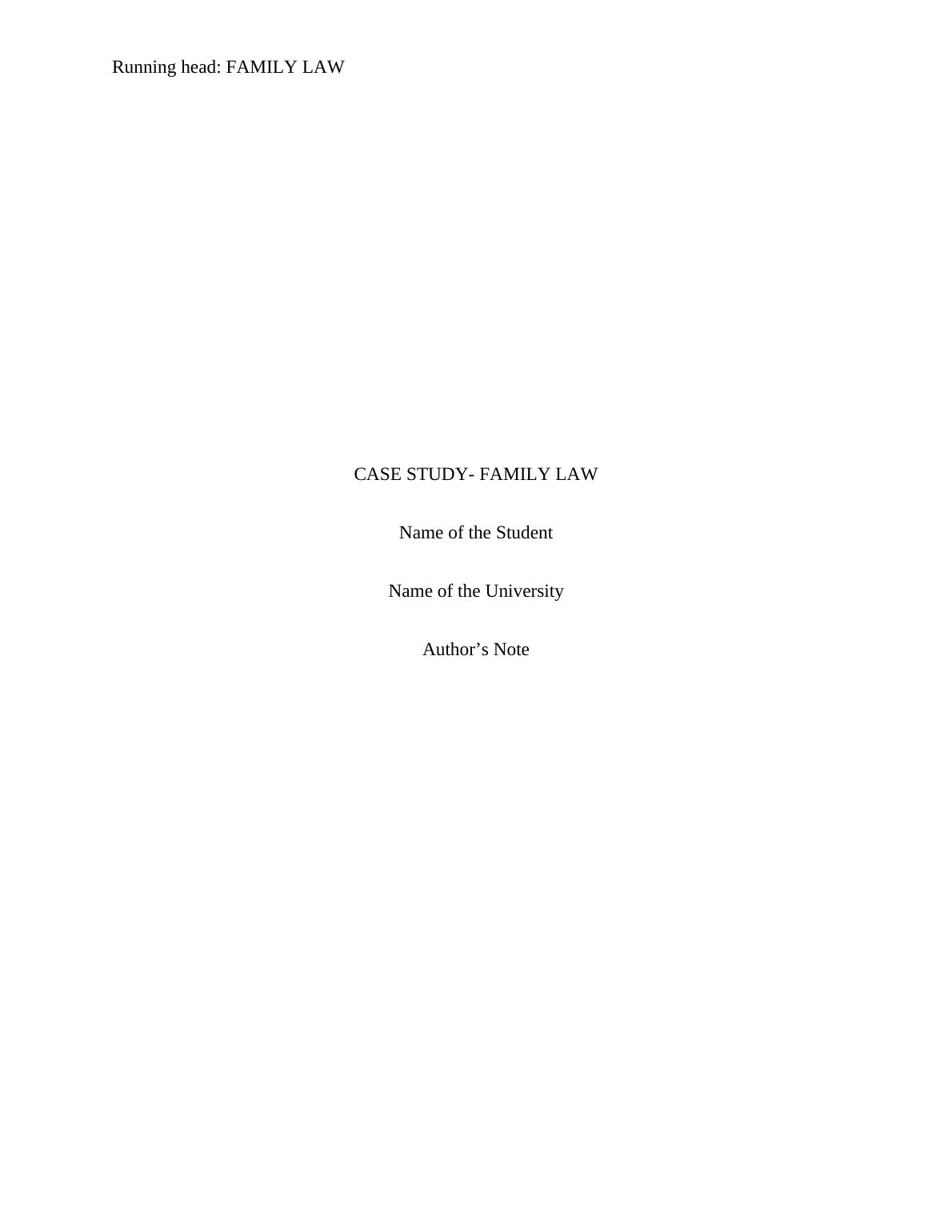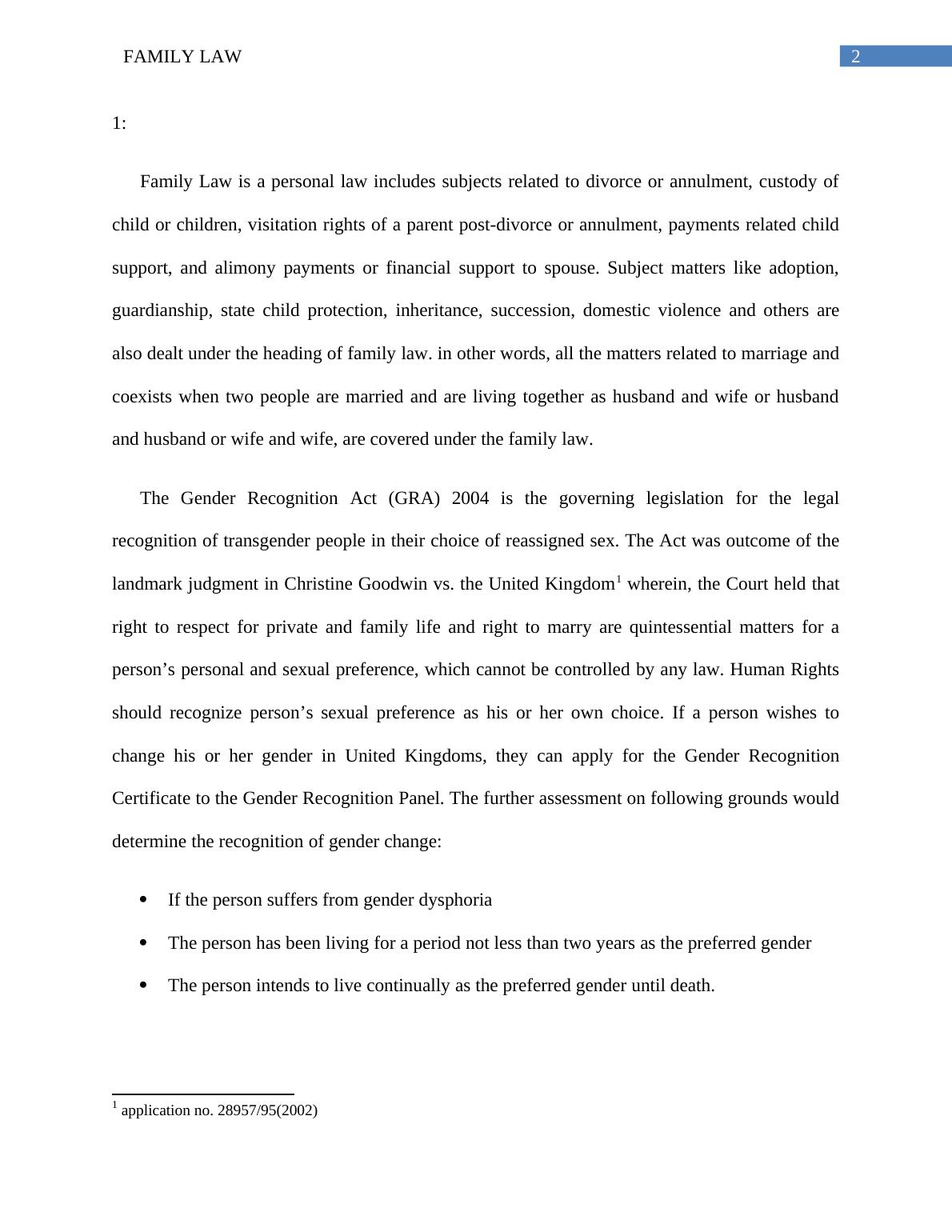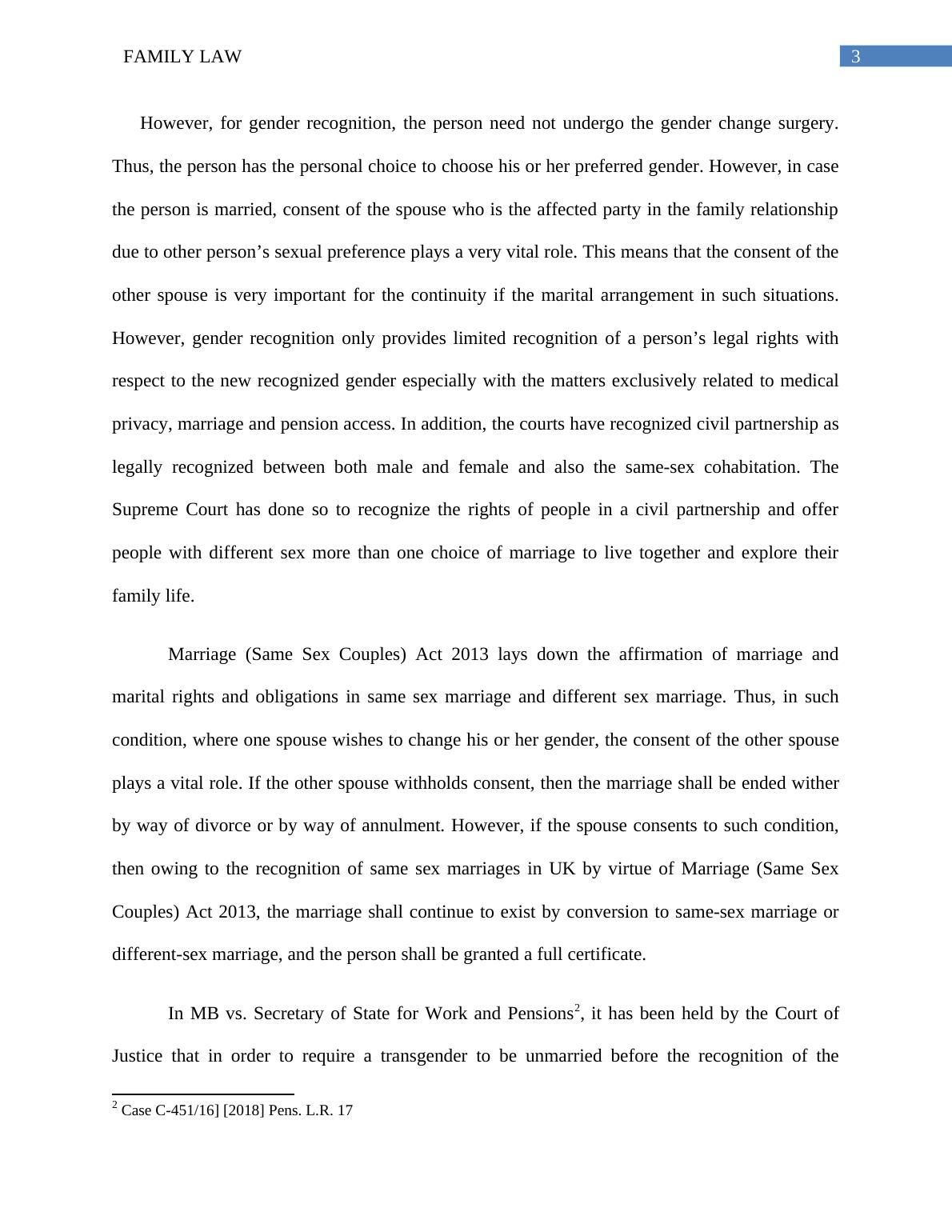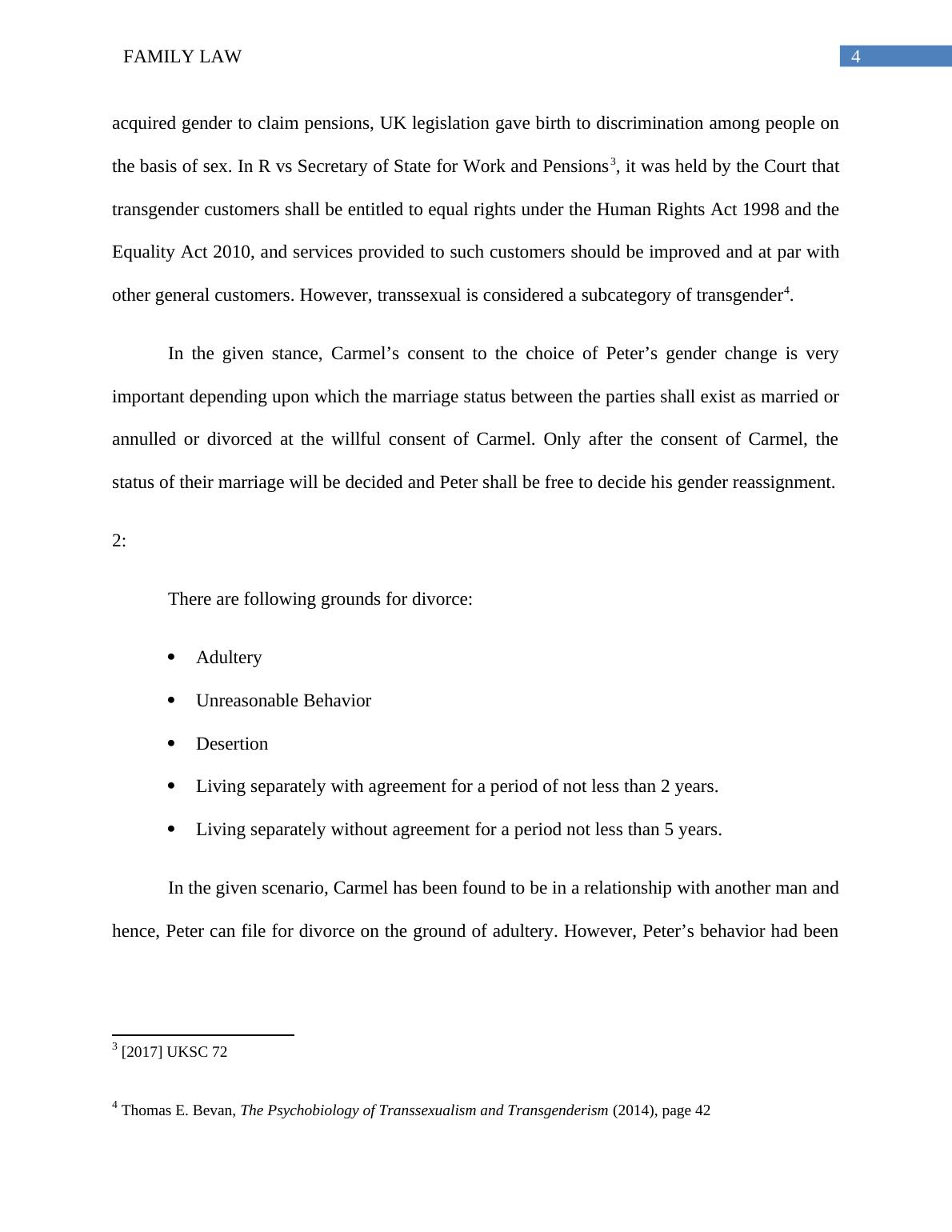Family Law or Personal Law Case Study 2022
Added on 2022-09-18
15 Pages3795 Words20 Views
Running head: FAMILY LAW
CASE STUDY- FAMILY LAW
Name of the Student
Name of the University
Author’s Note
CASE STUDY- FAMILY LAW
Name of the Student
Name of the University
Author’s Note

FAMILY LAW2
1:
Family Law is a personal law includes subjects related to divorce or annulment, custody of
child or children, visitation rights of a parent post-divorce or annulment, payments related child
support, and alimony payments or financial support to spouse. Subject matters like adoption,
guardianship, state child protection, inheritance, succession, domestic violence and others are
also dealt under the heading of family law. in other words, all the matters related to marriage and
coexists when two people are married and are living together as husband and wife or husband
and husband or wife and wife, are covered under the family law.
The Gender Recognition Act (GRA) 2004 is the governing legislation for the legal
recognition of transgender people in their choice of reassigned sex. The Act was outcome of the
landmark judgment in Christine Goodwin vs. the United Kingdom1 wherein, the Court held that
right to respect for private and family life and right to marry are quintessential matters for a
person’s personal and sexual preference, which cannot be controlled by any law. Human Rights
should recognize person’s sexual preference as his or her own choice. If a person wishes to
change his or her gender in United Kingdoms, they can apply for the Gender Recognition
Certificate to the Gender Recognition Panel. The further assessment on following grounds would
determine the recognition of gender change:
If the person suffers from gender dysphoria
The person has been living for a period not less than two years as the preferred gender
The person intends to live continually as the preferred gender until death.
1 application no. 28957/95(2002)
1:
Family Law is a personal law includes subjects related to divorce or annulment, custody of
child or children, visitation rights of a parent post-divorce or annulment, payments related child
support, and alimony payments or financial support to spouse. Subject matters like adoption,
guardianship, state child protection, inheritance, succession, domestic violence and others are
also dealt under the heading of family law. in other words, all the matters related to marriage and
coexists when two people are married and are living together as husband and wife or husband
and husband or wife and wife, are covered under the family law.
The Gender Recognition Act (GRA) 2004 is the governing legislation for the legal
recognition of transgender people in their choice of reassigned sex. The Act was outcome of the
landmark judgment in Christine Goodwin vs. the United Kingdom1 wherein, the Court held that
right to respect for private and family life and right to marry are quintessential matters for a
person’s personal and sexual preference, which cannot be controlled by any law. Human Rights
should recognize person’s sexual preference as his or her own choice. If a person wishes to
change his or her gender in United Kingdoms, they can apply for the Gender Recognition
Certificate to the Gender Recognition Panel. The further assessment on following grounds would
determine the recognition of gender change:
If the person suffers from gender dysphoria
The person has been living for a period not less than two years as the preferred gender
The person intends to live continually as the preferred gender until death.
1 application no. 28957/95(2002)

FAMILY LAW3
However, for gender recognition, the person need not undergo the gender change surgery.
Thus, the person has the personal choice to choose his or her preferred gender. However, in case
the person is married, consent of the spouse who is the affected party in the family relationship
due to other person’s sexual preference plays a very vital role. This means that the consent of the
other spouse is very important for the continuity if the marital arrangement in such situations.
However, gender recognition only provides limited recognition of a person’s legal rights with
respect to the new recognized gender especially with the matters exclusively related to medical
privacy, marriage and pension access. In addition, the courts have recognized civil partnership as
legally recognized between both male and female and also the same-sex cohabitation. The
Supreme Court has done so to recognize the rights of people in a civil partnership and offer
people with different sex more than one choice of marriage to live together and explore their
family life.
Marriage (Same Sex Couples) Act 2013 lays down the affirmation of marriage and
marital rights and obligations in same sex marriage and different sex marriage. Thus, in such
condition, where one spouse wishes to change his or her gender, the consent of the other spouse
plays a vital role. If the other spouse withholds consent, then the marriage shall be ended wither
by way of divorce or by way of annulment. However, if the spouse consents to such condition,
then owing to the recognition of same sex marriages in UK by virtue of Marriage (Same Sex
Couples) Act 2013, the marriage shall continue to exist by conversion to same-sex marriage or
different-sex marriage, and the person shall be granted a full certificate.
In MB vs. Secretary of State for Work and Pensions2, it has been held by the Court of
Justice that in order to require a transgender to be unmarried before the recognition of the
2 Case C-451/16] [2018] Pens. L.R. 17
However, for gender recognition, the person need not undergo the gender change surgery.
Thus, the person has the personal choice to choose his or her preferred gender. However, in case
the person is married, consent of the spouse who is the affected party in the family relationship
due to other person’s sexual preference plays a very vital role. This means that the consent of the
other spouse is very important for the continuity if the marital arrangement in such situations.
However, gender recognition only provides limited recognition of a person’s legal rights with
respect to the new recognized gender especially with the matters exclusively related to medical
privacy, marriage and pension access. In addition, the courts have recognized civil partnership as
legally recognized between both male and female and also the same-sex cohabitation. The
Supreme Court has done so to recognize the rights of people in a civil partnership and offer
people with different sex more than one choice of marriage to live together and explore their
family life.
Marriage (Same Sex Couples) Act 2013 lays down the affirmation of marriage and
marital rights and obligations in same sex marriage and different sex marriage. Thus, in such
condition, where one spouse wishes to change his or her gender, the consent of the other spouse
plays a vital role. If the other spouse withholds consent, then the marriage shall be ended wither
by way of divorce or by way of annulment. However, if the spouse consents to such condition,
then owing to the recognition of same sex marriages in UK by virtue of Marriage (Same Sex
Couples) Act 2013, the marriage shall continue to exist by conversion to same-sex marriage or
different-sex marriage, and the person shall be granted a full certificate.
In MB vs. Secretary of State for Work and Pensions2, it has been held by the Court of
Justice that in order to require a transgender to be unmarried before the recognition of the
2 Case C-451/16] [2018] Pens. L.R. 17

FAMILY LAW4
acquired gender to claim pensions, UK legislation gave birth to discrimination among people on
the basis of sex. In R vs Secretary of State for Work and Pensions3, it was held by the Court that
transgender customers shall be entitled to equal rights under the Human Rights Act 1998 and the
Equality Act 2010, and services provided to such customers should be improved and at par with
other general customers. However, transsexual is considered a subcategory of transgender4.
In the given stance, Carmel’s consent to the choice of Peter’s gender change is very
important depending upon which the marriage status between the parties shall exist as married or
annulled or divorced at the willful consent of Carmel. Only after the consent of Carmel, the
status of their marriage will be decided and Peter shall be free to decide his gender reassignment.
2:
There are following grounds for divorce:
Adultery
Unreasonable Behavior
Desertion
Living separately with agreement for a period of not less than 2 years.
Living separately without agreement for a period not less than 5 years.
In the given scenario, Carmel has been found to be in a relationship with another man and
hence, Peter can file for divorce on the ground of adultery. However, Peter’s behavior had been
3 [2017] UKSC 72
4 Thomas E. Bevan, The Psychobiology of Transsexualism and Transgenderism (2014), page 42
acquired gender to claim pensions, UK legislation gave birth to discrimination among people on
the basis of sex. In R vs Secretary of State for Work and Pensions3, it was held by the Court that
transgender customers shall be entitled to equal rights under the Human Rights Act 1998 and the
Equality Act 2010, and services provided to such customers should be improved and at par with
other general customers. However, transsexual is considered a subcategory of transgender4.
In the given stance, Carmel’s consent to the choice of Peter’s gender change is very
important depending upon which the marriage status between the parties shall exist as married or
annulled or divorced at the willful consent of Carmel. Only after the consent of Carmel, the
status of their marriage will be decided and Peter shall be free to decide his gender reassignment.
2:
There are following grounds for divorce:
Adultery
Unreasonable Behavior
Desertion
Living separately with agreement for a period of not less than 2 years.
Living separately without agreement for a period not less than 5 years.
In the given scenario, Carmel has been found to be in a relationship with another man and
hence, Peter can file for divorce on the ground of adultery. However, Peter’s behavior had been
3 [2017] UKSC 72
4 Thomas E. Bevan, The Psychobiology of Transsexualism and Transgenderism (2014), page 42

End of preview
Want to access all the pages? Upload your documents or become a member.
Related Documents
Report on Family law - Matrimonial Act 1973lg...
|6
|1625
|102
English Criminal Law- R vs. R Caselg...
|8
|2872
|58
Report on Family Law Caselg...
|11
|2457
|236
Law and Historylg...
|9
|2494
|61
(Solution) Family Law - Assignmentlg...
|9
|2378
|14
Family Law Memorandum of Advice Assignmentlg...
|22
|6350
|500
